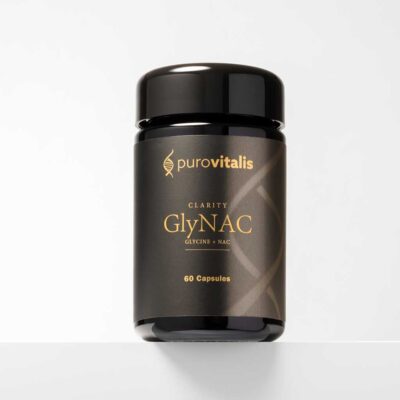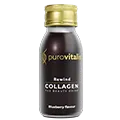
Glycine might be the smallest amino acid, but don’t let its size fool you—it plays a huge role in your body. It’s a building block for proteins and is essential for producing collagen, the protein that keeps your skin firm, your joints flexible, and your connective tissues strong. But that’s not all. Glycine also acts as a neurotransmitter in the brain, helping to regulate nerve signals. This means it can influence everything from sleep quality and mental clarity to relaxation and even longevity.
Research: Your body’s glycine might not be enough
Your body does produce glycine on its own—mainly by converting the amino acid serine through metabolic processes in the liver. Research shows that glycine production ranges from approximately 2.28 to 3.12 grams per day in adult males, depending on dietary protein intake—whether from meat, fish, vegetarian, or vegan sources.[1].The issue is, that might not be enough.
Research suggests that glycine, long considered a “non-essential” amino acid, may actually be “conditionally essential” under certain conditions. This means that while your body can make it, production may fall short when you need it the most—during pregnancy, aging, intense exercise, chronic stress, inflammation, or illness. Studies suggest that 10-15 grams per day could be the ideal intake for optimal health, far more than what the body naturally produces [2,3].
See which foods contain the most glycine and how to include them in your diet here.
The many glycine benefits
Glycine is more than just a simple amino acid—it plays a crucial role in many of the body’s essential functions. From supporting brain health and reducing stress to aiding digestion, collagen production, and even longevity, glycine has a wide range of benefits that go beyond basic protein synthesis.
Because of these many functions, the body will always prioritize using glycine—whether from diet or collagen supplements—for the most essential tasks first. This mechanism of glycine use highlights the importance of ensuring an adequate glycine intake so that all its vital roles in the body can be fully supported.
A neurotransmitter that calms the brain
Glycine isn’t just a structural component of proteins—it also acts as a neurotransmitter in the central nervous system. Your glycine receptors make sure it plays a key role in balancing nerve signals, helping to calm the nervous system and reduce overstimulation. There are other glycine health benefits – here’s our rundown:
Glycine for better sleep
Research shows that glycine can improve sleep quality by lowering body temperature at night and increasing serotonin levels, which supports melatonin production. Many people report falling asleep faster and waking up more refreshed after increasing their glycine intake. A study found that taking 3 grams of glycine before bed helped people with unsatisfactory sleep fall asleep faster, improve sleep efficiency, and feel less fatigued the next day[4].
Glycine and anxiety relief
Additionally, glycine has been found to reduce symptoms of anxiety by promoting relaxation and stabilizing mood. Research on glycine’s effects on anxiety further supports this, as a study on patients with adjustment disorder found that four weeks of glycine supplementation reduced anxiety symptoms by 31%, compared to 15% in the placebo group. The most significant improvements were seen in anxious mood, sleep disturbances, and tension, suggesting that glycine may help manage stress-related anxiety effectively[5].
Supporting gut health and reducing inflammation
Inflammation in the gut can lead to various digestive issues, and glycine has been shown to have anti-inflammatory effects[6]. It helps maintain the intestinal barrier, reducing the risk of leaky gut syndrome. Studies also suggest that glycine could play a role in managing inflammatory bowel diseases like Crohn’s and ulcerative colitis by modulating immune responses in the gut [7].
Collagen production for skin and hair
One of glycine’s most important roles is in collagen synthesis. Collagen is like the body’s natural glue, holding skin, joints, and connective tissues together. It keeps skin firm, joints flexible, and hair strong.
Read more here: Liquid collagen benefits, dosage and possible Side Effects
Glycine benefits for skin
As we age, collagen production declines, leading to wrinkles and sagging skin. Since glycine is a key building block of collagen, ensuring sufficient intake supports skin structure and repair.
A double-blind, placebo-controlled study (Proksch et al., 2014) found that daily supplementation with 2.5–5 g of collagen peptides for eight weeks significantly improved skin elasticity compared to placebo. The effect persisted even four weeks after stopping supplementation, particularly in older participants, highlighting the importance of glycine and collagen peptides in maintaining firm, hydrated skin[8].
Related: Bovine Collagen Peptides: benefits, safety and types
Glycine benefits for hair
Glycine plays a key role in keratin production and supports collagen formation, helping to strengthen hair and reduce breakage. Research suggests that glycine benefits for hair include improved structure and resilience. A study on a cosmetic foam with glycine, caffeine, zinc, and polyphenols found a significant reduction in the telogen rate and increased hair density after six months[9].
While the study didn’t isolate glycine’s effect, it suggests that glycine, as part of a nutrient-rich formula, may support healthier, thicker hair over time.
You might also find this blog interesting: Is collagen good for men?
Muscle repair and physical performance
Glycine plays an important role in protecting muscle mass, particularly under conditions of stress, illness, or caloric restriction. It aids in protein metabolism and supports creatine production, which helps muscles generate energy during exercise. Research suggests that glycine supplementation may help counteract muscle breakdown, especially in aging individuals or those experiencing muscle-wasting conditions[10].
Balancing blood sugar and metabolic health
New research highlights glycine’s role in insulin regulation and glucose metabolism. Higher glycine levels have been linked to better insulin sensitivity and a lower risk of type 2 diabetes. It may also contribute to fat metabolism, supporting a healthy body composition [11].
Mitochondrial health and longevity
Mitochondria, the energy powerhouses of our cells, rely on glycine for optimal function. Studies suggest that glycine may help reduce oxidative stress, a major factor in aging and age-related diseases. Some longevity research even indicates that glycine supplementation could extend lifespan by enhancing cellular function and reducing inflammation [12].
A key player in the immune system
By acting as a precursor to glutathione, one of the body’s most powerful antioxidants, glycine helps protect cells from damage and supports immune function. It plays a role in reducing chronic inflammation, which is linked to many diseases, including cardiovascular issues and neurodegenerative conditions.
Glycine supplementation
Glycine can be taken in various forms, each offering unique advantages:
| Supplement Form | Description |
|---|---|
| Collagen supplements | Glycine is naturally found in collagen, making it easier for the body to absorb when taken as part of a collagen supplement. |
| Glycine powder | A simple and versatile option that can be mixed into water, smoothies, or other beverages. |
| Capsules or tablets | A convenient choice for those who prefer pre-measured doses. |
| Bone broth | A natural source of glycine, providing additional nutrients for joint and gut health. |
| Combination supplements | Glycine is often paired with other amino acids like taurine to enhance its benefits. |
Maximize glycine absorption with collagen
Collagen is the primary structural protein in connective tissues such as bones, skin, ligaments, tendons, and cartilage, and even in the cornea of the eye—with glycine making up approximately 33% of its total amino acid content. While there are many different types of collagen in the body, glycine is always present in the same proportion, highlighting its essential role in collagen’s structure and function.
A great way to boost your glycine intake is by taking Purovitalis Rewind Collagen Drink. This can be a more effective approach since glycine is better absorbed when consumed as part of collagen rather than on its own. When taken in free form, glycine competes with other amino acids for absorption, whereas in collagen, it is naturally bound to other amino acids, enhancing its uptake.
Glycine and taurine: A powerful duo
Combining glycine and taurine offers synergistic benefits for healthy aging. These amino acids support antioxidant defenses, reduce oxidative stress, and promote cellular health. Their roles in neurotransmitter function and cognitive well-being may aid sleep, stress management, and mood balance. Additionally, their combined effects on cardiovascular and metabolic health provide a comprehensive approach to longevity.
Glycine safety and dosage
Glycine is generally recognized as safe and well-tolerated, even at higher doses. Most studies use doses ranging from 3 to 10 grams per day, depending on the intended purpose. Research has shown benefits from taking 3 grams before bedtime for sleep and relaxation, while 10-15 grams daily may be optimal for collagen production and metabolic health.
Side effects for glycine use are rare, but at very high doses, some individuals may experience mild digestive discomfort. Glycine may also have a slight blood pressure-lowering effect, which people with low blood pressure should be aware of. As with any supplement, it is recommended to start with a low dose and gradually increase if needed.
Final thoughts
Glycine is one of the most versatile amino acids in the body, playing a key role in everything from sleep and stress management to collagen production, muscle building, and metabolic health. While the body produces some glycine on its own, research suggests that a higher intake—whether through diet, collagen, or glycine supplements—can support health and aging on multiple levels.
Humans produce only a limited amount of glycine due to a natural biological constraint. This means we often need extra glycine from food or supplements to meet the body’s needs. One of the easiest ways to increase glycine intake is by supplementing with collagen, as it contains a high amount of glycine.
Whether you’re looking to improve sleep, strengthen skin and joints, or support overall health, glycine can be a valuable addition to your daily routine.
References:
1. Alves, A., Bassot, A., Bulteau, A.-L., Pirola, L., & Morio, B. (2019). Glycine metabolism and its alterations in obesity and metabolic diseases. Nutrients, 11(6), 1356.
2. Razak, M. A., Begum, P. S., Viswanath, B., & Rajagopal, S. (2017). Multifarious beneficial effect of nonessential amino acid, glycine: A review. Oxidative Medicine and Cellular Longevity, 2017, 1716701.
3. Meléndez-Hevia, E., De Paz-Lugo, P., Cornish-Bowden, A., & Cárdenas, M. L. (2009). A weak link in metabolism: The metabolic capacity for glycine biosynthesis does not satisfy the need for collagen synthesis. Journal of Biosciences, 34(6), 853–872.
4. Yamadera, W., Inagawa, K., Chiba, S., Bannai, M., Takahashi, M., & Nakayama, K. (2007). Glycine ingestion improves subjective sleep quality in human volunteers, correlating with polysomnographic changes. Sleep and Biological Rhythms.
5. Grigorova, O. V., Romasenko, L. V., Vazagaeva, T. I., Maksimova, L. N., & Nartsissov, Ya. R. (2012). Therapy efficiency of anxiety at patients with adjustment disorder, on glycine therapy model with placebo-sensibility. Russian Psychiatric Journal, 4, УДК 616.89-008.44-085.
6. Aguayo-Cerón, K. A., Sánchez-Muñoz, F., Gutierrez-Rojas, R. A., Acevedo-Villavicencio, L. N., Flores-Zarate, A. V., Huang, F., Giacoman-Martinez, A., Villafaña, S., & Romero-Nava, R. (2023). Glycine: The smallest anti-inflammatory micronutrient. International Journal of Molecular Sciences, 24(14), 11236.
7. Sugihara, K., Morhardt, T. L., & Kamada, N. (2019). The role of dietary nutrients in inflammatory bowel disease. Frontiers in Immunology, 9, 3183.
8. Proksch, E., Segger, D., Degwert, J., Schunck, M., Zague, V., & Oesser, S. (2014). Oral supplementation of specific collagen peptides has beneficial effects on human skin physiology: A double-blind, placebo-controlled study. Skin Pharmacology and Physiology, 27(1), 47–55.
9. Welzel, J., Wolff, H. H., & Gehring, W. (2021). Reduction of telogen rate and increase of hair density in androgenetic alopecia by a cosmetic product: Results of a randomized, prospective, vehicle-controlled double-blind study in men. Journal of Cosmetic Dermatology.
10. Koopman, R., Caldow, M. K., Ham, D. J., & Lynch, G. S. (2017). Glycine metabolism in skeletal muscle: Implications for metabolic homeostasis. Current Opinion in Clinical Nutrition and Metabolic Care, 20(4), 237–242.
11. Yan-Do, R., & MacDonald, P. E. (2017). Impaired “Glycine”-mia in Type 2 diabetes and potential mechanisms contributing to glucose homeostasis. Endocrinology, 158(5), 1064–1073.
12. Johnson, A. A., & Cuellar, T. L. (2023). Glycine and aging: Evidence and mechanisms. Ageing Research Reviews, 87, 101922.

GlyNAC – Powerful Cellular Synergy Support glutathione production Fuel cellular energy
Experience the proven synergy of Glycine and N-Acetyl-Cysteïne. Together, they work more effectively than alone to restore glutathione levels, enhance mitochondrial function, and reduce oxidative stress.

Experience the best of Collagen with Purovitalis liquid formula. Try it out!














